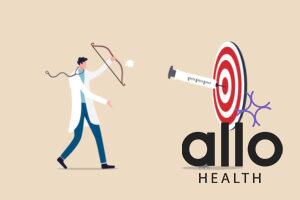Masturbation & Erectile Dysfunction

Allo Health is dedicated to personalized well-being, offering support and trusted information tailored to individual health goals. The platform emphasizes human-generated content, led by a distinguished medical team of experts, including physicians and sexual health specialists. Their commitment to credibility involves rigorous fact-checking, authoritative research, and continuous updates to ensure accurate, up-to-date information. Allo Health's unique approach goes beyond conventional platforms, providing expert-led insights and a continuous commitment to excellence, with user feedback playing a crucial role in shaping the platform's authoritative voice.

A Psychotherapist with Clinical specialization, working for over seven years now. Areas of specialization range from Anxiety-related disorders, Mood-related disorders, Personality disorders, Sexual dysfunctions & other mental health issues.
Why This Was Upated?
Our experts continually monitor the health and wellness space, and we update our articles when new information became available.
Updated on 22 May, 2024
- Article was updated as part of our commitment to diversity, equity, and inclusion.

"The following blog article provides general information and insights on various topics. However, it is important to note that the information presented is not intended as professional advice in any specific field or area. The content of this blog is for general educational and informational purposes only.
Book consultation
The content should not be interpreted as endorsement, recommendation, or guarantee of any product, service, or information mentioned. Readers are solely responsible for the decisions and actions they take based on the information provided in this blog. It is essential to exercise individual judgment, critical thinking, and personal responsibility when applying or implementing any information or suggestions discussed in the blog."
What is Masturbation?
- Masturbation is the act of sexually stimulating one’s own body, typically the genitals, for the purpose of experiencing sexual pleasure and, in some cases, achieving orgasm.
- It is a common and natural form of sexual expression practiced by individuals of all genders and ages.
- Masturbation is often done using one’s hands, but it can also involve the use of sex toys or other objects.
- It is considered a safe and healthy sexual activity that can provide stress relief, improve sexual function, and enhance one’s understanding of their own body and sexual preferences.
What are the Disadvantages of Masturbation?
While masturbation is a normal and healthy aspect of human sexuality, excessive or compulsive masturbation can lead to some potential disadvantages. These may include:
- Physical Discomfort: Overly vigorous or frequent masturbation can lead to physical discomfort, including soreness, chafing, or even mild injuries to the genital area.
- Interference with Daily Activities: Engaging in excessive masturbation may lead to spending an inordinate amount of time on the activity, potentially interfering with daily responsibilities, work, or social interactions.
- Negative Impact on Relationships: If one partner in a relationship is engaging in excessive masturbation, it may lead to a lack of interest or satisfaction in sexual activities with a partner. This can potentially strain relationships.
- Psychological Effects: In some cases, excessive masturbation may be a sign of underlying psychological issues such as anxiety, depression, or compulsive behavior. It can also potentially lead to feelings of guilt or shame.
- Impact on Sexual Function: While occasional masturbation is not likely to cause sexual dysfunction, excessive masturbation may lead to desensitization or conditioning to a specific type of stimulation, potentially making it more difficult to achieve arousal or orgasm in other situations.
- Distorted Perception of Sexuality: If masturbation becomes the primary or sole means of sexual expression, it may lead to a skewed perception of one’s own sexuality, potentially impacting one’s ability to engage in satisfying sexual relationships.
It’s important to remember that moderation is key. If an individual feels that their masturbation habits are causing distress or interfering with their daily life, seeking advice from a healthcare professional or therapist can be beneficial. They can offer guidance and support in managing one’s sexual health in a balanced and healthy way.
What is Erectile Dysfunction?
- Erectile Dysfunction (ED) refers to the consistent difficulty or inability to attain and maintain an erection during sex.
- It is a common condition that can affect men of all ages, although it is more prevalent in older individuals.
- ED can be caused by various factors, including physical conditions like heart disease, diabetes, or hormonal imbalances, as well as psychological factors such as stress, anxiety, or depression.
- Lifestyle choices like smoking, excessive alcohol consumption, and lack of exercise can also contribute to the development of ED.
- Seeking medical advice and treatment options can effectively address this condition, allowing individuals to regain their sexual confidence and overall well-being.

What are the Causes of Erectile Dysfunction?
Erectile dysfunction (ED) can be attributed to a range of physical, psychological, and lifestyle factors.
Physical Factors
- It often stems from concerns related to blood flow, nerve function, or hormonal imbalances. Conditions such as cardiovascular disease, diabetes, hypertension, and high cholesterol can impede proper blood circulation, affecting erectile function.
- Neurological disorders like multiple sclerosis or Parkinson’s disease can disrupt the transmission of nerve signals required for achieving and sustaining an erection.
- Additionally, hormonal imbalances, particularly low testosterone levels, can contribute to ED.
Psychological Factors
- Stress, anxiety, depression, and relationship problems can have a significant impact on sexual performance.
- These factors can lead to increased levels of cortisol, a stress hormone, which can interfere with the body’s ability to achieve and maintain an erection.
- Moreover, performance anxiety or negative sexual experiences can create psychological barriers to sexual arousal.
Lifestyle Factors
- Smoking, excessive alcohol consumption, and drug abuse can impair blood flow and damage blood vessels, affecting erectile function.
- Sedentary habits and obesity are associated with various health issues, including those related to cardiovascular health, which can contribute to ED.
- Lastly, medications for conditions like hypertension, depression, and certain prostate conditions can have ED as a side effect.
- It’s important for individuals experiencing ED to consult with a healthcare provider to determine the underlying cause and explore appropriate treatment options.
Can Excessive Masturbation Cause Sexual Dysfunction?
- Excessive masturbation, when pursued to the point of compulsivity or interfering with daily life activities, has been associated with potential negative effects on sexual health.
- Some individuals who engage in compulsive or overly frequent masturbation may find it challenging to become aroused or maintain an erection during partnered sexual activity. This can lead to a condition known as sexual dysfunction.
- While excessive masturbation can contribute to sexual difficulties, it is not the sole cause, and various other factors such as underlying medical conditions, psychological concerns, or lifestyle choices can also play significant roles in the development of sexual dysfunction.
- Moreover, it can potentially lead to desensitization of the genitals, making it more difficult to achieve sexual satisfaction through normal sexual activity.
- This can create a cycle where individuals engage in even more frequent masturbation in an attempt to compensate, further exacerbating the issue.
- It’s crucial for individuals experiencing sexual difficulties associated with excessive masturbation to seek professional guidance.
- A healthcare provider can help identify the root causes and provide appropriate treatment options, which may include counseling, lifestyle adjustments, and, in some cases, medical interventions.
Treating Erectile Dysfunction

Treating erectile dysfunction involves addressing the underlying psychological factors that may be contributing to the concern. Some of the common treatment options available in India include:
- Counseling and therapy: These services can assist people in addressing psychological concerns that may be causing erectile dysfunction as well as masturbating. Counseling sessions can aid in lowering stress and guilt, boosting self-esteem, and enhancing sexual function.
- Medicine: Medication may be administered in some circumstances to treat ED. Professionals prescribed medications such as sildenafil, vardenafil, and tadalafil. These medications aid in enhancing sexual performance and enhancing blood flow to the penis.
- Lifestyle Modifications: Implementing lifestyle modifications can assist to enhance general health and sexual performance. This includes getting regular exercise, eating a good diet, abstaining from alcohol and cigarettes, and controlling stress,
While there may no scientific proof that excessive masturbation causes ED, there are psychological factors variables like shame and anxiety may suggest a connection between the two.
By using counselling and therapy, medication, and dietary modifications, both masturbation and erectile dysfunction can be treated, as can the underlying psychological concerns that may be causing them. To improve your sexual health concerns, it is important that you get expert assistance if you are having concerns with masturbation or ED.
Summary
- Masturbation is a natural form of sexual expression involving self-stimulation, commonly done using hands or with aids like sex toys. It provides stress relief and enhances sexual self-awareness.
- While generally healthy, excessive or compulsive masturbation can lead to physical discomfort, interfere with daily activities, strain relationships, and potentially have psychological impacts.
- ED is the consistent difficulty in achieving and maintaining a firm erection for satisfactory sexual performance. It can result from various physical, psychological, and lifestyle factors.
- Physical factors include cardiovascular issues, neurological disorders, and hormonal imbalances. Psychological factors like stress, anxiety, and lifestyle choices such as smoking can also contribute to ED.
- Compulsive masturbation can potentially lead to sexual dysfunction, but it’s not the sole cause. Other factors like medical conditions and psychological concerns play significant roles.
- Seeking professional guidance is crucial. Treatment may involve counseling, medication, and lifestyle adjustments to improve overall sexual health and address any concerns with masturbation or ED.
Frequently Asked Questions
Q: Can masturbation affect sexual performance with a partner?
A: Excessive masturbation may lead to desensitization, potentially impacting sexual arousal with a partner.
Q: Are there non-medication treatments for ED?
A: Yes, therapies like vacuum erection devices, penile implants, and lifestyle modifications can be effective for some individuals.
Q: What are the common risk factors for ED?
A: Common risk factors for erectile dysfunction (ED) include age, with prevalence increasing with advancing years. Additionally, underlying health conditions like diabetes, cardiovascular disease, and obesity significantly elevate the risk of developing ED.






































